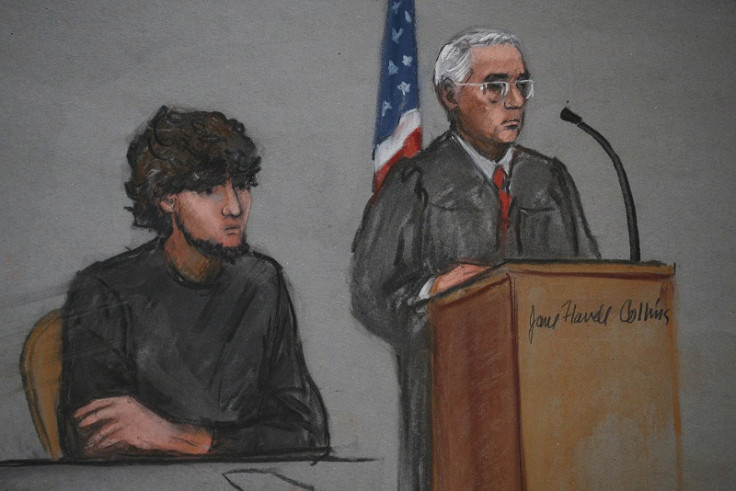Boston Marathon bombing: Will Massachusetts jury sentence Dzhokhar Tsarnaev to death?

Dzhokhar Tsarnaev's conviction on all charges over the Boston Marathon bombing has opened what is arguably the most interesting phase of the federal trial: the jury's deliberation on whether he should be sentenced to death.
Tsarnaev's role in the 2013 blast that killed three people and injured more than 260 was widely accepted, including by his lawyer who on the opening day of the trial said: "It was him."
Thus, the jury's guilty verdict against the 21-year-old came as no real surprise. Tsarnaev is now eligible for capital punishment, as 17 of the 30 counts he has been found guilty of carry the death penalty.
Proceedings should resume as early as next week (13 April) for what will therefore be their core part: the penalty phase, where some interesting factors will come into play.
The trial is held in Massachusetts, which has historically opposed capital punishment. The last defendants to be electrocuted in the eastern US state were murderers Phillip Bellino and Edward Gertson in May 1947.
The death penalty was eventually abolished in 1984 but remained in place for federal cases, such as that of the Boston Marathon bombing.
A Boston Globe poll conducted in September 2013 found that only 33% of the city residents believed Tsarnaev should be punished by death for the attack he carried out only a few months earlier, with 57% maintaining he should be given life without parole.
Among those supporting Tsarnaev's execution is Massachusetts Governor Charlie Baker. "I said last year that for a crime like this, I would support the death penalty. I continue to, but obviously this is a decision that gets made by the jury," he said after the guilty verdict was read, The Eagle Tribune reported.
Nationwide, the percentage of those thinking the convicted bomber should die rises to 47%, according to a more recent NBC News survey.
The jury of seven women and five men who will decide Tsarnaev's fate, however, has been selected from the minority of Massachusetts' population that doesn't oppose capital punishment on ideological grounds.
Due to the nature of the case, in fact, all those who were said to be generally against the use of the death penalty, were automatically excluded during the jury selection process. Nevertheless, legal experts have warned that this singular circumstance doesn't automatically imply jurors will easily lean towards putting Tsarnaev to death.
"They are breathing the cultural air that generally does not favour this penalty," former federal prosecutor Caleb Mason told MSNBC. "Thus, they are going to think much longer and harder than would jurors who come from a cultural environment where it is simply understood that murderers should be executed."
The case for them to spare the young man's life will be made by his lawyer, Judy Clarke, one of the top US anti-death-penalty attorneys. "Few people are better at this than Judy," South Carolina defence attorney Chris Adams told the Boston Herald.
Clarke, a San Diego lawyer, has previously saved from the death row infamous defendants such as "Unabomber" Ted Kaczynski, Atlanta Olympics bomber Eric Rudolph and 9/11 al-Qaeda plotter Zacarias Moussaoui.
In the coming weeks, she is expected to deepen the argument already aired in the first part of Tsarnaev's trial that her client was strongly influenced and radicalized by his older and now-dead brother Tamerlan, the alleged mastermind of the attack.
"The crime is so horrific that they don't have much else really to point to, other than his age and the influence of his older brother," former federal prosecutor Dan Collins told AP. "At this point, it's going to be the life experiences and the perspectives of the jurors in deciding whether or not they believe that these points are strong enough that his life should be spared".
Prosecutors will instead present the jury with evidence of aggravating factors such as the Tsarnaev's brothers' decision to target a public event to maximize bloodshed.
"I think the existence of other victims is an important point the government will emphasize," Collins said. "One of the aggravating factors that exists under the statute is the grave risk of death to additional persons, and showing that this bombing did have a widespread effect on other individuals is going to be one of the things they are going to point to."
Jurors need to reach a unanimous verdict for Tsarnaev to receive a death sentence.
© Copyright IBTimes 2025. All rights reserved.






















